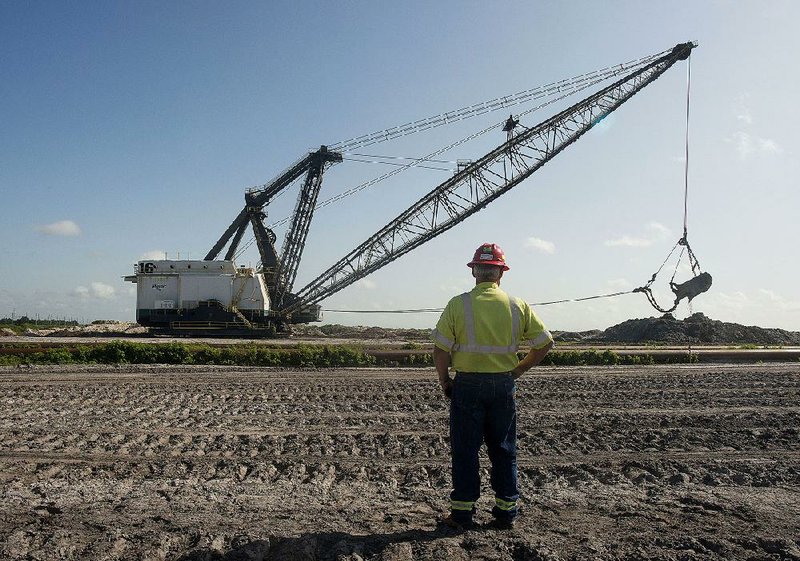GAINESVILLE, Fla. -- The Mosaic Co., one of the world's largest fertilize-makers, has settled a federal lawsuit that amounts to nearly $2 billion in fixes, improvements and cleanup after decades of environmental damage in Florida and Louisiana caused by hill-sized piles of acidic hazardous waste.
Since the 1960s, toxic waste from fertilizer production in Florida and Louisiana has been growing in 500-foot-high piles that can span more than 600 acres.
The sites have polluted nearby waterways and the air, and they have been a source of environmental degradation for decades. A major spill during Hurricane Frances in 2004 near Tampa Bay, Fla., sent 65 million gallons of acidic waste into nearby waterways, killing thousands of fish and other marine life.
For years, the waste from fertilizer production polluted the Mississippi River in Louisiana until the Clean Water Act stopped the practice in 1972. Later, New Orleans and others had to fight to stop a renewed effort to dump the pollution into the river, the chief source of drinking water for the city.
The U.S. Environmental Protection Agency and U.S. Department of Justice announced the agreement Thursday with Minnesota-based The Mosaic Co., which has owned the sites since a 2004 merger. The deal still needs to be finalized by the courts.
"Mosaic and its company predecessors have a checkered environmental history," said Guerry McClellan, a University of Florida geology professor. "About 10-15 years ago the fertilizer companies realized that their future would be better served if they worked with the EPA and other regulatory agencies. Most of the companies now accept their responsibilities and act accordingly."
The legal agreement concerns the proper storage and disposal of more than 60 billion pounds of hazardous waste at eight facilities. Mosaic makes a commonly used phosphorus-based fertilizer, the production of which creates solid waste and polluted water. Because sulfuric acid is used in the process, much of the waste contains high levels of acid.
Mosaic stores the waste in some of the largest man-made waste piles in the U.S. at its facilities in Florida and Louisiana. These piles, some created before the nation's Clean Water Act and other modern environmental laws, have been polluting for decades.
The fight to stop the dumping into the Mississippi was "a key one that made people aware of the dangers of the chemicals coming out of these plants on the river," Darryl Malek-Wiley of the Sierra Club said.
In addition to the Hurricane Frances spill, another of the company's piles in Polk County, Fla., collapsed into a sinkhole in 1994, sending tons of waste into the earth.
The EPA found the company's improper handling of its facilities posed a threat to the environment and human health.
"This case is a major victory for clean water, public health and communities across Florida and Louisiana," Cynthia Giles, assistant administrator for EPA's Office of Enforcement and Compliance Assurance, said in a statement.
Mosaic mines phosphate rock from pits in central Florida, which it turns into fertilizer at plants in Louisiana and Florida and ships all over the world. EPA inspectors discovered that the company was mixing highly corrosive substances from its fertilizer operations with the solid waste and wastewater from mineral processing -- a violation of federal and state hazardous-waste laws.
The company is to pay for the future closure of four of its facilities using a $630 million trust fund it is creating under the settlement. That money will be invested until it reaches $1.8 billion, which will pay for the closures.
The company also agrees to pay $170 million on environmental cleanup and other projects, and $3 million total to Louisiana and Florida.
Joc O'Rourke, Mosaic's president and chief executive officer, said in a statement that the company is happy to bring the matter to a close.
"In the years since EPA began this enforcement initiative, Mosaic has voluntarily made a number of major improvements to and significant capital investments in our facilities to enhance environmental performance, and the settlements will build upon that good work," O'Rourke said.
The Justice Department said the lawsuit has spurred Mosaic to change the way it does business and helps set the standard in the entire phosphoric acid industry.
"This settlement ... will have a significant impact on bringing all Mosaic facilities into compliance with the law," said John Cruden, a Justice Department assistant attorney general.
Information for this article was contributed by Cain Burdeau of The Associated Press.
Business on 10/02/2015
